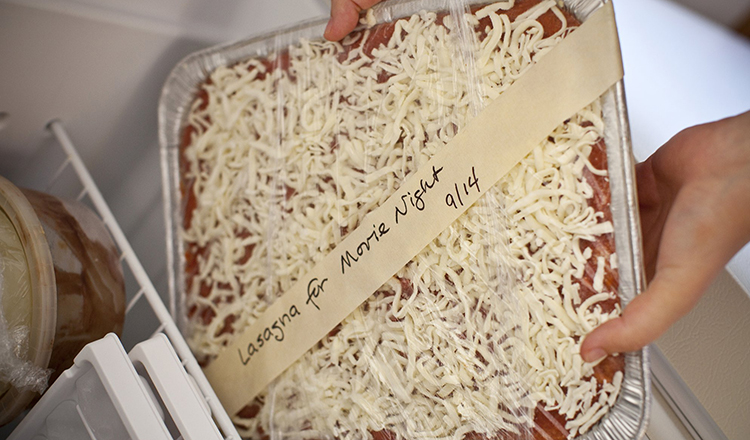
One of the most frequently asked questions from guests at our CIA campuses is: “Can I freeze this?” And it’s a good question! After all, no matter how much you like to cook, there are some days that having a back-up dinner ready to go can be a life-saver.
You’ll see in recipe notes, “This dish freezes well…” but how do we know? Let’s break it down.
You might be happy to know that the most common answer to “Can I freeze this?” is yes! There are very few foods that don’t freeze well in one form or another. There isn’t an easy set of rules for what you can and can’t freeze (experience helps here!), but here are some things to keep in mind:
- Raw vegetables don’t freeze well, so you won’t want to freeze salads or sandwiches containing raw veggies. If you want to freeze plain vegetables for the purpose of preserving, blanch the vegetables first, and then freeze them spread out on a baking sheet. That even includes tender greens, like spinach or Swiss chard. Freeze cooked vegetables to reheat later. Typically a quick trip to a hot oven will refresh veggies, but if you find they're too soft to enjoy as is, you can blend them into a soup or sandwich spread.
- Meat, poultry, and fish can be frozen raw or cooked. Wrap grilled, roasted, or sautéed meat very tightly in two layers of plastic wrap, but store any braised or stewed meat in its cooking liquid to help keep it moist.
- Items that contain lots of milk, cream, or other dairy products have a habit of separating when they defrost, so cream soups, mashed potatoes, custards, and creamy casseroles like macaroni and cheese may be unappealing once defrosted. Heating can often solve this problem, or a quick trip to the blender for puréed items. Dense dairy products, like cheese, are great for the freezer, though, so save cheeses wrapped up tight in freezer paper or a zip-top bag. Even a small amount can come in handy down the road.
- Grain items, like bread, rolls, tortillas, pasta, cooked rice, cooked quinoa, quick-breads, and muffins all freeze exceptionally well. This includes rice-based dishes like fried rice or jambalaya, or pasta dishes like lasagna or homemade ravioli.
- Braised and stewed items are perfect freezer meals, including soups, pot roast, braised collard greens, and tomato sauce. Transfer to freezer-safe containers or zip-top bags for easy storage.
- Cakes, pastries, and even pies can be frozen if wrapped up tightly. Once they are defrosted, pop them in a hot oven for 10 minutes or so. They will refresh and re-crisp.
- Casseroles can be frozen right in their serving dish. Pre-cooking the casserole can help remove moisture that may cause sogginess once it’s defrosted. Remember: don’t bake a glass or ceramic casserole dish straight from the freezer; it may crack in the oven.
- Yes, you can freeze dishes containing wine, beer, or other spirits. In fact, you can freeze leftover wine and beer in an ice cube tray or silicone muffin tin to use in other dishes, since the alcohol content is too low to keep it from freezing.
Remember, no item is too small, and we encourage you to save scraps of leftover meals to combine for an easy lunch or dinner down the road. A cup of quinoa, 1/4 cup of pesto sauce, and a handful of roasted veggies could be your best, easiest homemade work-from-home lunch yet!
Did we miss a dish you’ve been curious about freezing? Ask us in the comments, and we’ll let you know—but we bet the answer is yes!

You missed raw shellfish ie a shellfish that was purchased defrosted at a meat/seafood counter. Since most shellfish is IQF on the boat it will have been defrosted if you buy it as “fresh”. It is my understanding that FDA doesn’t recommend re-freezing shell fish. Correct?
As long as the shellfish was safely defrosted (meaning, in the refrigerator at an appropriate temperature versus on a counter at room temp, for example), it is perfectly safe to refreeze. A good grocery store or fish market should be following appropriate defrosting guidelines, in which case, the shellfish would be safe to refreeze. If you have any concerns that your seafood or fish may not have been handled properly at a market or store, best not to eat it at all.